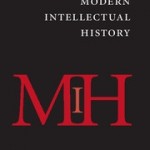 We are delighted to welcome four scholars to our inaugural Modern Intellectual History-USIH Early Career Workshop. It’s organized around three themes: knowledge and belief, archives and intellectual history, and political economy. We are grateful to our workshop leaders, Audrey Wu Clark and Brandon R. Byrd, for leading this fantastic new initiative. Learn more about the workshop participants’ scholarship-in-progress below.
We are delighted to welcome four scholars to our inaugural Modern Intellectual History-USIH Early Career Workshop. It’s organized around three themes: knowledge and belief, archives and intellectual history, and political economy. We are grateful to our workshop leaders, Audrey Wu Clark and Brandon R. Byrd, for leading this fantastic new initiative. Learn more about the workshop participants’ scholarship-in-progress below.
Jacob Bruggeman, Johns Hopkins University: In my MIH Early Career Workshop paper, I show how, across the 1980s and 90s, American politicians, policymakers, and tech companies made a concerted effort to integrate digital subcultures of computer hackers into governance regimes of the public and private sphere. The paper traces a double-movement: social dynamics in hacker communities, on the one hand, and rapidly shifting concepts of security, professionalism, and expertise in American political and corporate discourse, on the other. The political significance of hacking, as a technical practice, was reshaped as organizations incorporated hackers into their ranks. Tropes of hackers as petty cybercrime or politically motivated tinkerers were transformed in the process. By the early 2000s, hacking, as a concept, had become an all-purpose but potent “style of reasoning,” to borrow a concept from Elizabeth Popp-Berman, that superseded other, older ways of thinking about politics in the so-called information age. Bridging works of digital anthropology pioneered by Gabriella Coleman and mainstream political histories by historians like Gary Gerstle, I argue that the reinterpretation of hacking as a novel form of professional expertise represented more than a process of mere professionalization — it signaled the ascent of new ideas about economics, individuality, and labor in the 1990s.
Bobby Cervantes, Harvard University: “This article examines the 1966 White House Conference “To Fulfill These Rights” primarily as an ideological battlefield of mid-twentieth-century anti-poverty policy and protest. Drawing on the conference’s archives, it reveals how poor Americans of all races and their allies challenged Great Society liberalism to advance their own visions. In doing so, they aimed to integrate demands for redistributive welfare programs and radical democracy reforms into the Democratic Party’s legislative agenda at the apex of the party’s power in Washington, D.C. Overall, it argues that the months-long planning sessions for the event reveal how the relationship between elites and the poor rested on an uneasy tension over how to conceptualize postwar poverty and cultivate ideas to eradicate it. Correspondence and notes from dozens of preparatory meetings illustrate the substance of quickly shifting ideas about the national action needed to attack poverty. Unanimity was elusive: thousands of people were involved in the conference’s planning, but many of the poorest participants agreed that their destitution was not a marginal problem in an affluent society. To acknowledge the conference’s significance in these terms reveals a portentous battle of ideas about wealth and want in the United States during one of its most consequential junctures.”
Chloe Hawkey, Harvard University: “In the 1920s and 1930s, amidst the final development of academic disciplines and the professionalization of humanistic and social scientific study, there was a boom of enthusiasm for its opposite—far-ranging, experimental interdisciplinary study. Traditionally, scholars have traced interdisciplinary study to the 1960s with the explosion of interest in Black Studies, Women’s Studies, and American Indian Studies, among others. Yet more than three decades before these fields emerged as activist fields, designed to help marginalized scholars claim space for research that challenged the political and disciplinary status quo, scholars in American, Medieval, and Far-Eastern studies staked a different claim to interdisciplinarity. For them, reaching across disciplinary divides was not a way to claim political power, but rather a way to work together to make sense of subjects that were overwhelmingly all-encompassing (American culture) or seemed shrouded in mystery and obscurity (the history of East Asia and the so-called “Dark Ages”). “Grasping after the Elusive: Interdisciplinarity in the Interwar Period” will explore the development of the fields of American Studies, Medieval Studies, and Far-Eastern Studies in the interwar period, arguing that scholars used interdisciplinary methods to approach subjects that seemed either too close or too distant (in time or space) for the traditional disciplines.”
Pekka Kolehmainen, John Morton Center for North American Studies and the Turku Institute for Advanced Studies at University of Turku, Finland: “My research explores the recent emergence and spread of vitalism as an antifeminist concept in the near history of the radical right. Due in particular to the influence of the book Bronze Age Mindset (2018), written by an internet pseudonym known as the “Bronze Age Pervert,” a subsection of the so-called alt-right has adopted vitalism as way of framing their antagonism toward the tenets of liberal democracy, industrial revolution, and even the very concept of “history.” They regard modern life as having been robbed of vitality, which they define through a rigidly hierarchical view toward gender. In practice, the movement adherents use the concept of vitalism to draw on aesthetics of patriarchal warrior masculinity in an effort to oppose what they call “the Longhouse”: a matriarchal society structure brought about by feminism. In my work, I contextualize this emergence of new vitalism via two intellectual historical trajectories: First is the near-historical radical right-wing movement called the Dark Enlightenment. The second is the longer history of antifeminism and male supremacism in the sphere of U.S. right.”

0